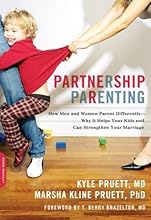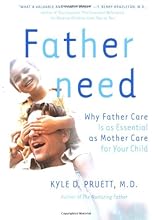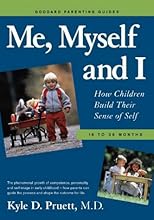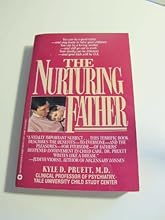Child Psychiatry Expert, Paternal Involvement Advocate, Author
Kyle Pruett Biography
As a Clinical Professor of Psychiatry at the Yale School of Medicine, Kyle D. Pruett, M.D., specializes in child and family development within the Child Study Center and the School of Nursing. He is renowned for his deep understanding of the emotional well-being of children, positioning it at the core of child development studies.
Dr. Pruett is a distinguished advocate for paternal involvement in child upbringing, emphasizing the significant role fathers play as an underutilized resource in their children’s lives. His pioneering work includes conducting the only long-term U.S. study on the impact of primary caretaking fathers on children. He has authored several influential books, including "The Nurturing Father," "Fatherneed," and "Partnership Parenting: How Men and Women Parent Differently—Why It Helps Your Kids and Can Strengthen Your Marriage," which highlight the transformative effects of active fatherhood.
In addition to his literary contributions, Dr. Pruett has extended his expertise to various media and public engagements. He hosted the Lifetime Television series "Your Child Six to Twelve with Dr. Kyle Pruett" and was chosen by Oprah Winfrey to host the award-winning video "Begin With Love." His insights are frequently featured in The New York Times, and he is a regular on National Public Radio and television. Dr. Pruett also engages in global discussions, offering insights into paternal engagement and its effects on community strengthening, with examples from Turkey, Alberta, and California. He continues to impact the field by serving as a past president of Zero to Three: The National Center for Infants, Toddlers, and their Families, and as a former member of the Sesame Workshop Board of Directors.
Contact a speaker booking agent to check availability on Kyle Pruett and other top speakers and celebrities.
Kyle Pruett Speaking Topics
-
Neglect: The Silent Epidemic
Kyle Pruett offers an eye-opening perspective on this most overlooked soon to be ‘discovered’, form of trauma in childhood. Pruett begins with a review of the compelling research on the power/prevalence of neglect, and how differently it impacts children and families than its more obvious (but frequent) partner, abuse. Forms of assessment and subsequent treatment are reviewed for efficacy, and why concerned clinicians and practitioners need to be thinking in more complex ways about this near epidemic is addressed with plenty of “what-to-do-about-it” advice and Q&A.
-
Music as Brain Food
As neuroscience advances, we are provided with new images almost weekly of how experience shapes the growing brain. Music has emerged as a remarkably influential architect: enhancing, connecting, and strengthening parts of the brain that are crucial in memory, problem solving, cognition, and emotion management to name a few. How this happens to whom, when, and why makes an intriguing illustrated (visual and auditory) story, with Kyle Pruett tying Lady Gaga to Beethoven and beyond. Dr. Pruett’s lifelong experience as a professional musician makes the Q&A segment of this presentation both animated and full of useful advice for parents and educators of the listener/performer/educators.
Kyle Pruett Videos




-
How do I book Kyle Pruett to speak at my event?
Our experienced booking agents have successfully helped clients around the world secure speakers like Kyle Pruett for speaking engagements, personal appearances, product endorsements, or corporate entertainment since 2002. Click the Check Availability button above and complete the form on this page to check availability for Kyle Pruett, or call our office at 1.800.698.2536 to discuss your upcoming event. One of our experienced agents will be happy to help you get speaking fee information and check availability for Kyle Pruett or any other speaker of your choice. -
What are the speaker fees for Kyle Pruett
Speaking fees for Kyle Pruett, or any other speakers and celebrities, are determined based on a number of factors and may change without notice. The estimated fees to book Kyle Pruett are $10,000 - $20,000 for live events and available upon request for virtual events. For the most current speaking fee to hire Kyle Pruett, click the Check Availability button above and complete the form on this page, or call our office at 1.800.698.2536 to speak directly with an experienced booking agent. -
What topics does Kyle Pruett speak about?
Kyle Pruett is a keynote speaker and industry expert whose speaking topics include Art & Design, Author, Business, Education, Family & Parenting, Health & Wellness, Human Resources, Men's Health, Mental Health, Non-Fiction Authors, Political, Psychology, Social Activism, Social Sciences -
Where does Kyle Pruett travel from?
Kyle Pruett generally travels from an undisclosed location, but can be booked for private corporate events, personal appearances, keynote speeches, or other performances. For more details, please contact an AAE Booking agent. -
Who is Kyle Pruett’s agent?
AAE Speakers Bureau has successfully booked keynote speakers like Kyle Pruett for clients worldwide since 2002. As a full-service speaker booking agency, we have access to virtually any speaker or celebrity in the world. Our agents are happy and able to submit an offer to the speaker or celebrity of your choice, letting you benefit from our reputation and long-standing relationships in the industry. Please click the Check Availability button above and complete the form on this page including the details of your event, or call our office at 1.800.698.2536, and one of our agents will assist you to book Kyle Pruett for your next private or corporate function. -
What is a full-service speaker booking agency?
AAE Speakers Bureau is a full-service speaker booking agency, meaning we can completely manage the speaker’s or celebrity’s engagement with your organization from the time of booking your speaker through the event’s completion. We provide all of the services you need to host Kyle Pruett or any other speaker of your choice, including offer negotiation, contractual assistance, accounting and billing, and event speaker travel and logistics services. When you book a speaker with us, we manage the process of hosting a speaker for you as an extension of your team. Our goal is to give our clients peace of mind and a best-in-class service experience when booking a speaker with us. -
Why is AAE Speakers Bureau different from other booking agencies?
If you’re looking for the best, unbiased speaker recommendations, paired with a top-notch customer service experience, you’re in the right place. At AAE Speakers Bureau, we exclusively represent the interests of our clients - professional organizations, companies, universities, and associations. We intentionally do not represent the speakers we feature or book. That is so we can present our clients with the broadest and best performing set of speaker options in the market today, and we can make these recommendations without any obligation to promote a specific speaker over another. This is why when our agents suggest a speaker for your event, you can be assured that they are of the highest quality with a history of proven success with our other clients.
Kyle Pruett is a keynote speaker and industry expert who speaks on a wide range of topics such as Neglect: The Silent Epidemic, Music as Brain Food, A Global Perspective on Paternal Engagement & Family Well-Being, Practical Neuroscience for Parents & Teachers, New Horizons in Father Engagement: What to Do with Dad After You Have His Attention and Not Too Young to Notice: The Impact of Violence in Today's World on Infants, Toddlers & Preschoolers. The estimated speaking fee range to book Kyle Pruett for your event is $10,000 - $20,000. Kyle Pruett generally travels from and can be booked for (private) corporate events, personal appearances, keynote speeches, or other performances. Similar motivational celebrity speakers are James Garbarino, Edward (Ned) Hallowell, Dr. Deborah Tannen, Rosalind Wiseman and Rachel Simmons. Contact All American Speakers for ratings, reviews, videos and information on scheduling Kyle Pruett for an upcoming live or virtual event.
This website is a resource for event professionals and strives to provide the most comprehensive catalog of thought leaders and industry experts to consider for speaking engagements. A listing or profile on this website does not imply an agency affiliation or endorsement by the talent.
All American Entertainment (AAE) exclusively represents the interests of talent buyers, and does not claim to be the agency or management for any speaker or artist on this site. AAE is a talent booking agency for paid events only. We do not handle requests for donation of time or media requests for interviews, and cannot provide celebrity contact information.
If you are the talent and wish to request a profile update or removal from our online directory, please submit a profile request form.






























